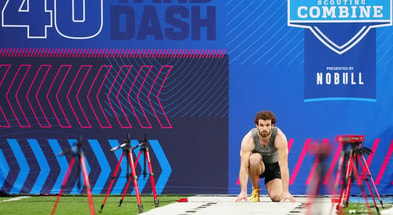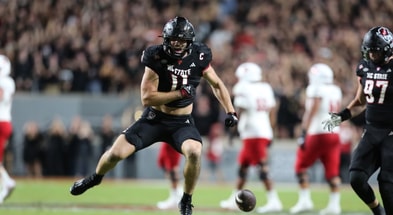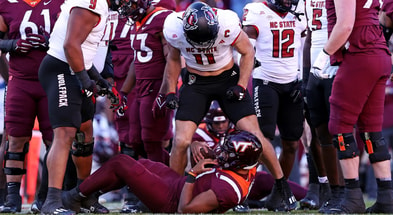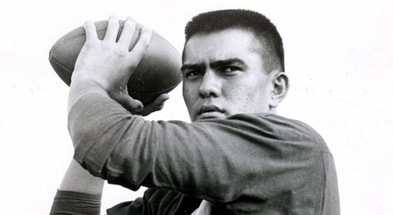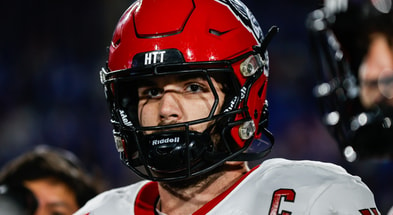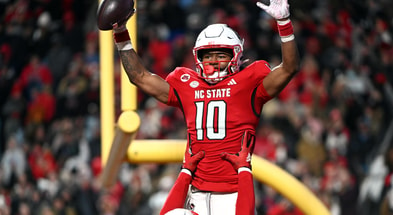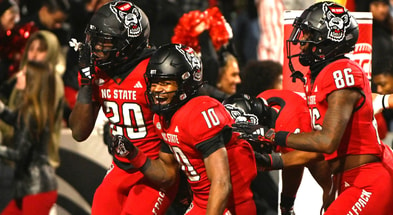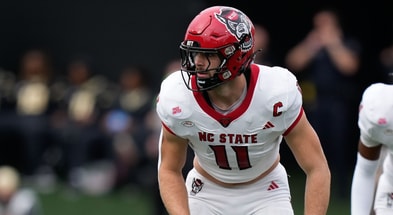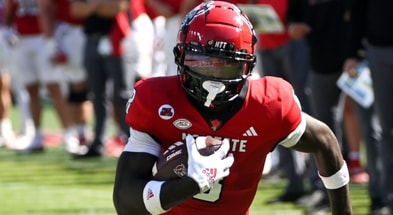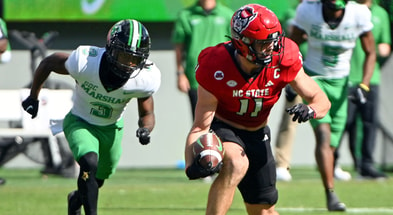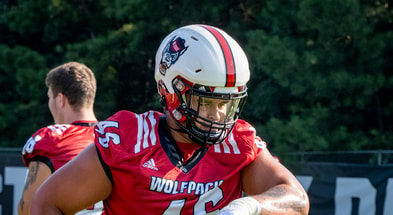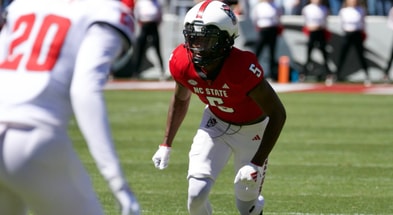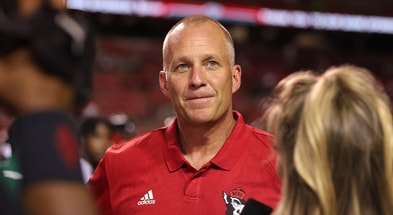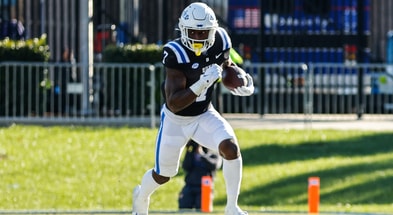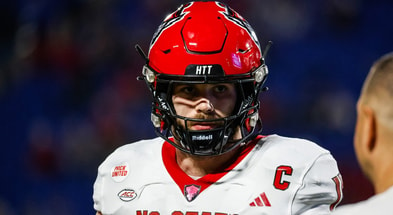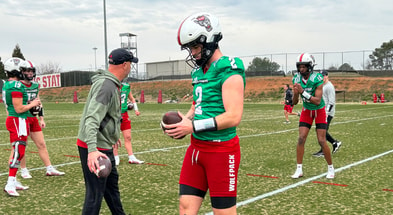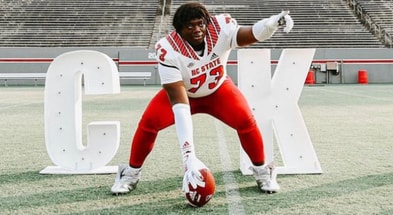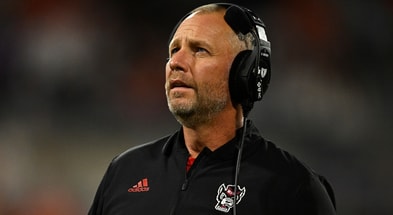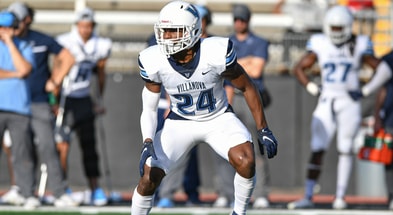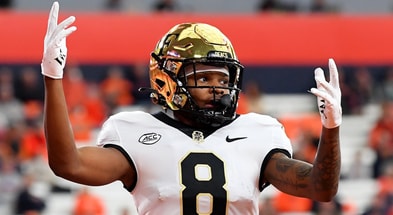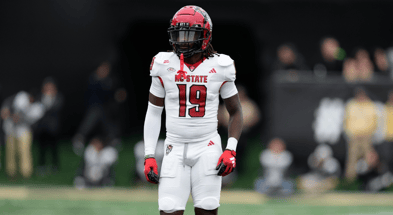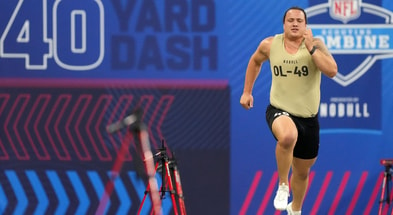NC State football past with UCLA involved legendary quarterbacks
Hollywood beckoned.
For former NC State All-America quarterback Roman Gabriel, it was a call he answered on three different occasions, first as a young Wolfpack player for head coach Earle Edwards, again as an MVP quarterback for reclamation artist George Allen with the Los Angeles Rams and finally as a celebrated actor in films and television shows with Jackie Gleason, John Wayne, Rock Hudson and so many others.
It all started on Friday, Nov. 13, 1959, when Gabriel and his Wolfpack teammates loaded up on an Army surplus prop plane for a chartered flight to Los Angeles, where they were scheduled to face UCLA in the cavernous 100,000-seat Los Angeles Coliseum.
When the stewardess welcomed the North Carolina Tar Heel football team, several players threatened to walk off the plane on the runway. She quickly apologized and they began their transcontinental journey, needing three stops to refuel before they touched down at LAX and were whisked to their hotel across Wilshire Boulevard from the famous Brown Derby restaurant.
Raleigh mayor William G. Enloe arranged for the team to take a bus tour of several television and movie sets, where they met starlets Dorothy Provine of “The Alaskans,” Connie Stevens of “The Hawaiian Eye”and reigning Miss USA Arlene Howell of “Bourbon Street Beat,” who begged for four tickets to the game so she could pull for the Wolfpack.
The tours weren’t exactly a big hit, especially when the studio tour guide said: “We don’t know much about your football, but we sure know a lot about your basketball team.” Everett Case’s hoops team had just one the most famous of all the Dixie Classics and won his 10th conference basketball championship in 13 seasons.
The football players eventually milled around for 45 minutes to see a two-minute clip of the TV show “Wagon Train” being filmed to the director’s perfection.
For Gabriel, it was a time-killing distraction from football.
“I was much more excited to see the Coliseum and play in a game where the Olympics were once held,” Gabriel says.
The 37-player travel roster worked out that Thursday night after their tour of Hollywood, then waited around their hotel the next day for the only Friday the 13th game in the history of NC State football. Kickoff was slated for 11:15 p.m. Eastern, so the Pack was really only susceptible to 45 minutes of bad luck in the contest.
As the Wolfpack and Bruins prepare to meet again in the Dec. 28 San Diego County Credit Union Holiday Bowl in San Diego, Gabriel has been asked by many to recall that the first game the Wolfpack ever played on the West Coast against a California team.
For him, it was an introduction to lifelong friend Billy Kilmer, the UCLA halfback who was later an NFL opposing quarterback when Gabriel played for the Los Angeles Rams and the Philadelphia Eagles and Kilmer played for the San Francisco 49ers, the New Orleans Saints and the Washington Redskins.
They shared the common ground of the legendary Allen, who molded both of them from unwanted reserves to celebrated NFL quarterbacks. In football retirement, they became fast friends working on multiple charitable projects.
“He’s my good friend to this day,” said Gabriel from his home in Little River, South Carolina.
The 1959 contest was the first of two football games played by State and UCLA in the Coliseum, with the second one being played the following season. It was at the height of the Pack football program’s efforts to raise operating funds by traveling all over the country to face intersectional rivals while only playing three or four home games at crumbling Riddick Stadium.

Beginning in 1955, when the Pack traveled to face Boston University and Villanova, Edwards took his team to far-flung locations like Mississippi Southern (now Southern Miss) and Wyoming to earn payouts that not only paid the bills for the football team but also helped fund the construction of a new football stadium near the North Carolina State Fairgrounds.
The 1959 game in Los Angeles followed consecutive trips to Mississippi and Wyoming the two previous weeks and the tired-legged Wolfpack entered the game against the Bruins as a nine-point underdog. It was also a costly endeavor, thanks to a $13,000 price tag for the charter flight, $2,000 in rooms and meals and $1,000 in other expenses for the game.
Few fans in Tinseltown were interested in the visitors from the East. Only 21,112 spectators showed up at the Coliseum, which the previous month hosted the Los Angeles Dodgers beating the Chicago White Sox in the World Series, a 4-2 LA victory that featured former NC State basketball player Roger Craig on the mound for the Dodgers and future Wolfpack assistant basketball and head baseball coach Sammy Esposito on the bench for the White Sox.
The State-UCLA football game was played late at night even for the West Coast and was sullied by a light fog and 60-degree temperatures.
For the first half, the Wolfpack barely showed up, as Kilmer led the Bruin offense to a 14-0 advantage and three additional trips inside the Wolfpack 5-yard-line without scoring. State didn’t make a first down in the first half and was outgained 174 yards to 14. Worse yet, only the only positive play of the first half, a Gabriel touchdown pass to John Morris was negated by an offensive holding penalty.
Kilmer threw an 18-yard pass to Jim Johnson for the first score of the game and Jim “Skip” Smith rambled 71 yards on a touchdown run.
“We had never played against a single-wing team before,” recalled Gabriel, who played linebacker and safety in the Wolfpack’s one-platoon lineup. “[Defensive coordinator] Al Michaels made some adjustments at halftime, and we came out a different team.”
Early in the third period, Gabriel handed off to teammate Ron Podwicka, who ran 28 yards for a touchdown to cut the lead to 14-6. Kilmer fumbled the ensuing kickoff away, but the Wolfpack could not capitalize.
Kilmer then threw a 44-yard touchdown pass to Marv Luster that seemingly gave them an insurmountable lead and head coach Bill Barnes sent in his substitutes.
Early in the fourth quarter, Gabriel threw a pass to the UCLA goal line intended for Podwicka, but he and Johnson wrestled for the ball all the way to the ground. Johnson was credited with a controversial interception, a call Gabriel disputes to this day.
Gabriel led the team back down the field on its next possession and threw the first touchdown pass of his career—and the first of many he threw during his decade of play at the Coliseum. It was a 6-yard pass to John Morris, but the two-point conversion failed and the Bruins held on for a 21-12 victory, the seventh consecutive loss of the season for the Wolfpack.
Playing halfback throughout the game, Kilmer ran for 105 yards on 14 carries and completed six of 13 passes for 124 yards. Smith had 107 yards on seven carries.
Gabriel completed 12 of 17 passes for 105 yards, six of which were caught by Claude “Hoot” Gibson.
The following year, on Oct. 22, 1960, the Bruins were a 14-point favorite, but the game ended up much closer. The Wolfpack again enjoyed some sightseeing, with players having the option of going to Disneyland or taking another tour of a Hollywood movie studio.
The game was a defensive struggle that turned when Gabriel was sacked by Bruin wide receiver/safety Marv Luster and fumbled the ball away inside the UCLA 30-yard line.
Earlier, Luster had scored the game’s only touchdown on a shoe-top catch in the end zone surrounded by two Wolfpack defenders that NC State coach Edwards contended angrily had touched the ground.
“Our game film showed that the ball did touch the ground,” Gabriel noted.
Bruin coach Barnes said at the time: “It wasn’t even close.”
Had the close loss gone the other way, it would have greatly improved the Wolfpack’s season, in which it finished tied for second in the ACC with a 4-1-1 record and a 6-3-1 overall record in the best (and only winning) season of Gabriel’s college career.
Gabriel’s NFL career mirrored that of Kilmer. Gabriel was named the 1969 NFL Player of the Year, the 1970 Pro Bowl Most Valuable Player and the 1973 NFL Comeback Player of the Year after being traded to Philadelphia. In 1989, he was inducted into the College Football Hall of Fame.
Kilmer not only led the Redskins to 1973 Super Bowl, he was a two-time All-Pro and Pro Bowl selection. He was inducted into the College Football Hall of Fame in 1999.
Both players had unsuccessful coaching careers, Gabriel famously as the coach of the winless Raleigh Skyhawks of the World League of American Football and three years at Cal Poly Pomona.
Kilmer coached the Shreveport Steamers of the American Football Association for one season and was commissioner of that league for one year.
Tim Peeler is a regular contributor to The Wolfpacker and can be reached at [email protected].
——
• Talk about NC State football inside The Wolves’ Den
• Subscribe to our podcast on iTunes
• Subscribe to our YouTube channel
• Learn more about our print and digital publication, The Wolfpacker
• Follow us on Twitter: @TheWolfpacker
• Like us on Facebook
